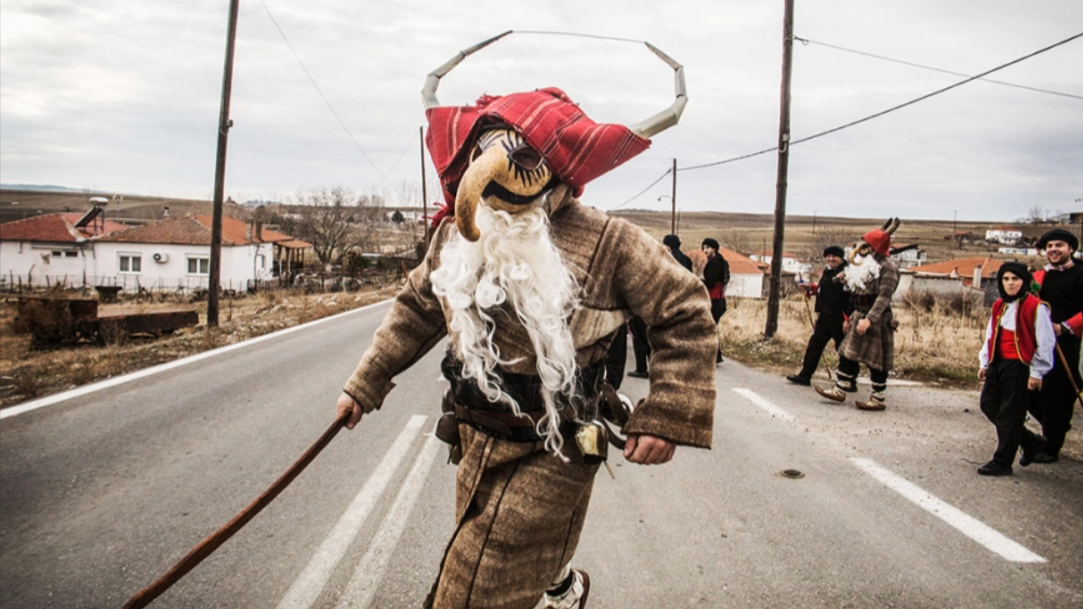By Marina Siskos.
Djurdjevic (2009) has said that the Balkan Peninsula generates more history than is able to consume. One tell-tale instance of Djurdjevic’s claim veracity is the nature of customs, rites and tales incorporated by the intense movement of population throughout the Balkans and mainly in the Eastern Rumelia and Thrace. The distinctiveness of Christmas celebrations is confessed and unique to the rest of the state.
This is a look into a folklore Christmas custom that takes place in Isaakio, Thrace: Pourpouris, an awe-inspiring performance with Pourpouris the main character, attracts the attention of local and occasionally nationwide media and interest and holds a rich history tracing back to the Asia Minor refugees.
Pourpouris is one of the “Ragouatsaria” (or “Ragoutsia”) rituals, that refer to the masquerades who move about singing festive traditional “kollianta,” the Christmas carols. Pourpouris revitalises a rite that dates back to the refugee ancestry of Thrace. In many ways, the performance of folklore could be called an exercise in behaviour modification (Wilson, 2006). Through the things people make with their words (verbal lore), hands (material lore), and their actions (customary lore), they attempt to create a social world more to their own liking (Wilson, 2006). Indeed, when [people] tell a story, or make a quilt, or perform a ceremony, they are usually attempting through the power of artistically successful forms, to influence the way people act, including at times, themselves (Wilson, 2006).
Refugee Origins:
Isaakio is a lowlander village of Thrace, on the frontiers of Turkey and the Evros river. According to a 2011 census, 407 permanent residents live in Isaakio. Pourpouris is also celebrated in Cheimonio, another lowland village of Thrace.
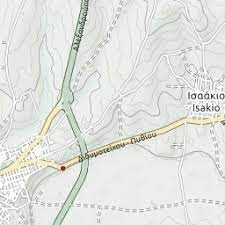
During the Twelve Days to Nativity, it was customary and characteristic of the inhabitants of the village Isaakio to disguise as a reminder of the festive time period (archaiologia.gr, 2016). The residents of Isaakio animated the custom of Pourpouris on the second, oftentimes even on the third day of Christmas: Pourpouris arrived with the 1922 “Sakpasiotes” as they were called, refugees from the seven villages opposite Eastern Thrace during their relocation there (archaiologia.gr, 2016). Pourpouris, the imposing, goblin-looking, horn-carrying creature, is vested in sheepskin and goes around the houses to sing the Nativity songs, “kalanta.”
As explained by Wilson (2006) folklore calls forth three broad categories: Things people make with words (verbal lore), things they make with their hands (material lore) and things they make with their actions (customary lore). Of course, Wilson elaborates (2006), many forms of folklore, overlap these categories. Such is the case of Thracian Pourpouris: a verbal, material, customary lore at once.
Pourpouris is vested in sheepskin and traditional, embroidered winter clothes to protect the wearer from the bitter cold of Thrace, sings Christmas songs and dances to the traditional instrumental music of Thrace.
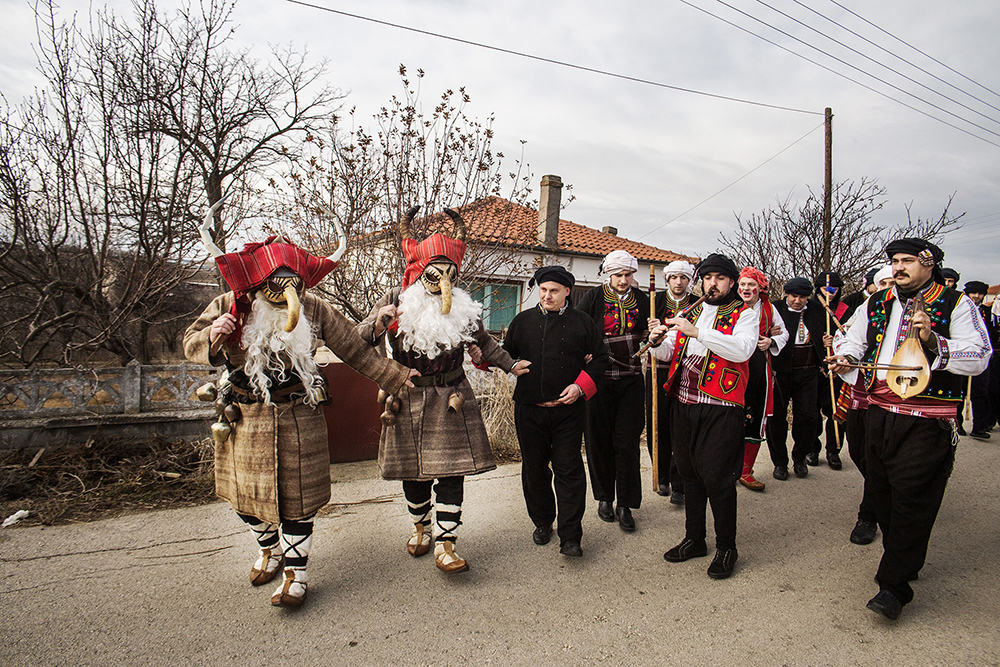
The Celebration:
Central figures of the custom are Pourpouris, the masquerade and his wife, Kortopoula (Efstathopoulou). Pourpouris wears bells that symbolise the hardships of the winter, and his disguise is meant to inspire fear to scare the evil spits aways from the village, meant to disappear during this holy time of the year. Kortopoula, his wife, stands for the fertility of the land, in extension the upcoming springtime and the blooming of nature. Since the rite is revived only by men, Kortopoula is actually a disguised man. Pourpouris chases away the men who attempt to approach his wife. The whole village takes part in the custom, singing, dancing, playing tricks and giving away treats and Christmas delicacies (Efstathopoulou).
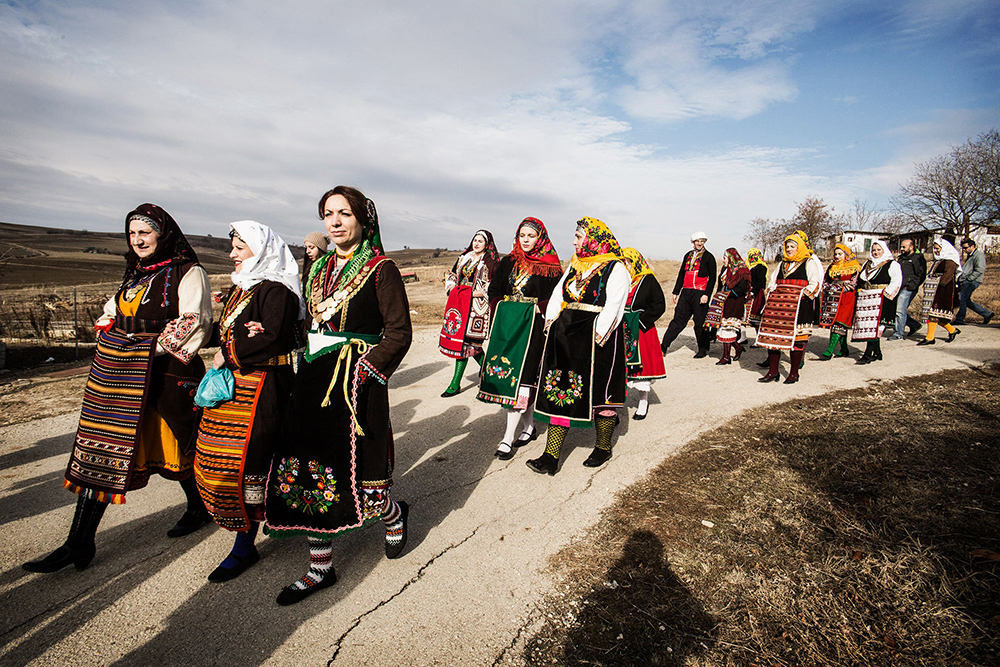
Meaning:
Folklore persists through time and space because the things people traditionally make with their words, hands and actions continue to give pleasure and satisfy artistic impulses common to the species (Wilson, 2006). Folklore persists also because it continues to meet basic human needs, says Wilson (2006).
Another custom that arrived with the refugee women from Eastern Romelia and that has taken roots is the gynecocratic custom of “Mpampo”: Mpampo, the eldest woman in the village, who is also the midwife (deserving a special status and respect by the members of the community). The married women of the village take Mpampo and, in a pompous march walk her around, singing sarcastic songs, while men are excluded from any participation. In case a man attempts to approach, the women hunt him down, throw water at him and undress him-the piece of the removed attire is then set up for auction. Following the completion of the celebration, the married women and Mpampo retreat and have a feast, secluded. The women make merry, eat and drink, sing and dance, all in exaggeration.
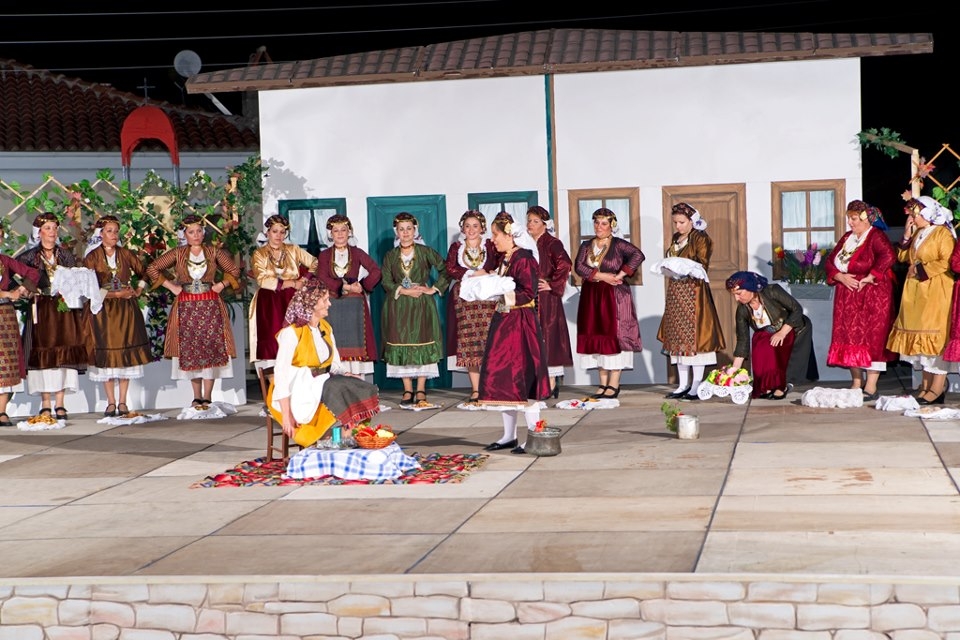
The custom of Mpampo takes place every year on the 8th of January the Nea Petra, Monokklisia and Charopo of Serrai. According the ethnological standpoint, the Mpampo custom traces back to the ancient Greek times, as it clearly recalls the Thesmophoria and the Aloa, that were held during the same time of the year (San Simera).
References:
- Archailogia.gr. (2016). H «Μπάμπω» και ο «Πουρπούρης». Θράκη: Δώδεκα Μέρες Γιορτής. Η «Μπάμπω» και ο «Πουρπούρης» (archaiologia.gr).
- Σαν Σήμερα. Το Έθιμο της Μπάμπως. https://www.sansimera.gr/articles/487
- Efstathopoulou, A. Θρακική Εστία και Συμμετοχή της στην Πολιτεία των Ευχών. Παρατηρητής. Θρακική Εστία και συμμετοχή της στην Πολιτεία των Ευχών | Καθημερινός Παρατηρητής (serresparatiritis.gr).
- Djurdjevij, M. (2009). The Balkans: Past and Present of Cultural Pluralism. Quanderns de la Mediterrania, 12. Spiritualities and Representations in Intercultural Dialogue. The Balkans: Past and Present of Cultural Pluralism : IEMed.
- Hobsbawm, E. (1983). Introduction: Inventing Traditions. In the Invention of Tradition, ed, E. Hobsbawm & T. Ranger. Cambridge: Cambridge University Press.
- Mccormack, T. (1969). Folk Culture and the Mass Media. European Journal of Sociology / Archives Européennes de Sociologie / Europäisches Archiv für Soziologie , 1969, Vol. 10, No. 2, Myths and Mass Media (1969), pp. 220-237. Published by: Cambridge University Press. Stable URL: http://www. jstor.com/stable/23998659.
- Nagel, J. (1994). Constructing Ethnicity: Creating and Recreating Ethnic Identity and Culture. Social Problems41:153-76. Oxford University Press on Behalf of the Society for the Study of Social Problems. Stable URL: https://www.jstor.org/stable/3096847.
- Wilson, W. A. (2006). Documenting Folklore. In J. T. Rudy & D. Call (Eds.), Marrow of Human Experience, The: Essays on Folklore by William A. Wilson (pp. 81–104). University Press of Colorado. https://doi.org/10.2307/j.ctt4cgkmk.10

